![Kristīne Opolais as Cio-Cio-San [Photo by Mike Hoban courtesy of The Royal Opera]](http://www.operatoday.com/MADAMA-BUTTERFLY.10077_0190.gif)
29 Jun 2011
Sensitive, intelligent Madama Butterfly, Royal Opera
This Madama Butterfly at the Royal Opera House, London, brings out the depth and intelligence of the human story Puccini might be trying to tell us, beneath the surface gloss.
English Touring Opera are delighted to announce a season of lyric monodramas to tour nationally from October to December. The season features music for solo singer and piano by Argento, Britten, Tippett and Shostakovich with a bold and inventive approach to making opera during social distancing.
This tenth of ten Live from London concerts was in fact a recorded live performance from California. It was no less enjoyable for that, and it was also uplifting to learn that this wasn’t in fact the ‘last’ LfL event that we will be able to enjoy, courtesy of VOCES8 and their fellow vocal ensembles (more below …).
Ever since Wigmore Hall announced their superb series of autumn concerts, all streamed live and available free of charge, I’d been looking forward to this song recital by Ian Bostridge and Imogen Cooper.
Although Stile Antico’s programme article for their Live from London recital introduced their selection from the many treasures of the English Renaissance in the context of the theological debates and upheavals of the Tudor and Elizabethan years, their performance was more evocative of private chamber music than of public liturgy.
Evidently, face masks don’t stifle appreciative “Bravo!”s. And, reducing audience numbers doesn’t lower the volume of such acclamations. For, the audience at Wigmore Hall gave soprano Elizabeth Llewellyn and pianist Simon Lepper a greatly deserved warm reception and hearty response following this lunchtime recital of late-Romantic song.
For this week’s Live from London vocal recital we moved from the home of VOCES8, St Anne and St Agnes in the City of London, to Kings Place, where The Sixteen - who have been associate artists at the venue for some time - presented a programme of music and words bound together by the theme of ‘reflection’.
'Such is your divine Disposation that both you excellently understand, and royally entertaine the Exercise of Musicke.’
‘And there was war in heaven: Michael and his angels fought against the dragon; and the dragon fought and his angels, And prevailed not; neither was their place found any more in heaven … that old serpent … Satan, which deceiveth the whole world: he was cast out into the earth, and his angels were cast out with him.’
There was never any doubt that the fifth of the twelve Met Stars Live in Concert broadcasts was going to be a palpably intense and vivid event, as well as a musically stunning and theatrically enervating experience.
‘Love’ was the theme for this Live from London performance by Apollo5. Given the complexity and diversity of that human emotion, and Apollo5’s reputation for versatility and diverse repertoire, ranging from Renaissance choral music to jazz, from contemporary classical works to popular song, it was no surprise that their programme spanned 500 years and several musical styles.
The Academy of St Martin in the Fields have titled their autumn series of eight concerts - which are taking place at 5pm and 7.30pm on two Saturdays each month at their home venue in Trafalgar Square, and being filmed for streaming the following Thursday - ‘re:connect’.
The London Symphony Orchestra opened their Autumn 2020 season with a homage to Oliver Knussen, who died at the age of 66 in July 2018. The programme traced a national musical lineage through the twentieth century, from Britten to Knussen, on to Mark-Anthony Turnage, and entwining the LSO and Rattle too.
With the Live from London digital vocal festival entering the second half of the series, the festival’s host, VOCES8, returned to their home at St Annes and St Agnes in the City of London to present a sequence of ‘Choral Dances’ - vocal music inspired by dance, embracing diverse genres from the Renaissance madrigal to swing jazz.
Just a few unison string wriggles from the opening of Mozart’s overture to Le nozze di Figaro are enough to make any opera-lover perch on the edge of their seat, in excited anticipation of the drama in music to come, so there could be no other curtain-raiser for this Gala Concert at the Royal Opera House, the latest instalment from ‘their House’ to ‘our houses’.
"Before the ending of the day, creator of all things, we pray that, with your accustomed mercy, you may watch over us."
The doors at The Metropolitan Opera will not open to live audiences until 2021 at the earliest, and the likelihood of normal operatic life resuming in cities around the world looks but a distant dream at present. But, while we may not be invited from our homes into the opera house for some time yet, with its free daily screenings of past productions and its pay-per-view Met Stars Live in Concert series, the Met continues to bring opera into our homes.
Music-making at this year’s Grange Festival Opera may have fallen silent in June and July, but the country house and extensive grounds of The Grange provided an ideal setting for a weekend of twelve specially conceived ‘promenade’ performances encompassing music and dance.
There’s a “slide of harmony” and “all the bones leave your body at that moment and you collapse to the floor, it’s so extraordinary.”
“Music for a while, shall all your cares beguile.”
The hum of bees rising from myriad scented blooms; gentle strains of birdsong; the cheerful chatter of picnickers beside a still lake; decorous thwacks of leather on willow; song and music floating through the warm evening air.
![Kristīne Opolais as Cio-Cio-San [Photo by Mike Hoban courtesy of The Royal Opera]](http://www.operatoday.com/MADAMA-BUTTERFLY.10077_0190.gif)
This Madama Butterfly at the Royal Opera House, London, brings out the depth and intelligence of the human story Puccini might be trying to tell us, beneath the surface gloss.
When this production of Puccini’s Madama Butterfly premiered in 2003, I remember being startled at how stark the production seemed, with its clean horizontal lines and open spaces. Very different indeed from the over-stuffed, over-fussy clutter of fin de siècle clichés about Japan. WesternJaponisme as decorative wrapping has little to do with reality. Madama Butterfly is a powerful opera because it deals with real human dilemmas, by no means unique to Japan or to the early 20th century.
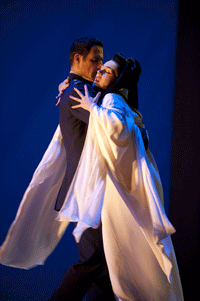 James Valenti as Pinkerton and Kristīne Opolais as Cio-Cio-San
James Valenti as Pinkerton and Kristīne Opolais as Cio-Cio-San
Instead, this production, directed by Moshe Leiser and Patrice Caurier, uses the Japanese context intelligently so it works with the drama. Japanese art is stylized, blank spaces part of the design, so key details stand out in sharp focus. The sets in this production, designed by Christian Fenouillat, are clean and open, so there’s no irrelevant distraction. The backdrop of shoji screens allows quick scene changes, contrasting the interior with the vast panorama outside. It’s a telling comment. As Goro points out, changing the walls changes perspective. This opera isn’t really “about” Japanese society as much as about the way people don’t perceive things in the same way.
As Caurier and Leiser said in their recent interview with Opera Today, Madama Butterfly is “not a beautiful story, it’s awful, it’s violent. Yes, you see the flowers but you must have the smell of blood running through them”. Throughout history, those with wealth and power have always been able to exploit those who don’t. Pinkerton buys a package, house, servants, mock family and a girl to use as sexual convenience. He’s infatuated temporarily by Butterfly’s beauty but he’s under no illusion that he’s interested in her other than as an object to gratify his ego. Perhaps that’s why he takes the child. He can’t conceive that its mother or culture mean anything.
Butterfly is so desperate to escape her background that even before she meets Pinkerton, she’s obsessed about becoming an instant American. She invests so much in her delusion that she can’t cope with reality. She kills herself, not simply because harakiri “is” custom, but because she’s invested so much into her fixation that she can’t live with reality…“nulla, nulla, fuor che la morte”.
Although this is the third revival of this production since 2003, the performance felt vivid because it was directed, not by substitutes, but by Leiser and Caurier themselves. Every performance has to be “new” because casts change and circumstances change. Patricia Racette, who has sung Cio Cio San many times before, pulled out at the last minute, but in some ways that was fortunate, because Kristine Opolais, making her Royal Opera House debut, throws herself so convincingly into the part that she makes it her own. She’s young enough to convey Butterfly’s innocence but has strength of personality, which comes through in her singing. She sings the love duet with such intensity that you wonder how a 15 year old could find such passion, especially for a stranger she’s just met. This emphasizes Butterfly’s single-minded determination. Reality doesn’t get in the way of imagination.
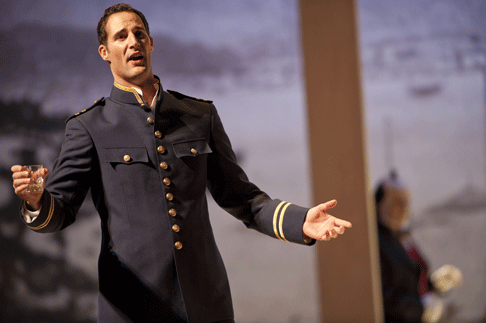 James Valenti as Pinkerton
James Valenti as Pinkerton
Opolais’s Butterfly is nicely varied. After the Bonze’s curse, her voice takes on a tense edge, showing that Butterfly is deeply traumatized, but soon switches back to gentleness when she turns to Pinkerton. Swift reactions matter, for Cio Cio San is always adapting, and living intensely in the moment. Opolias’s interaction with Dolore (Niklas Allan) feels genuine. She’s not singing to an object, or a puppet, but as real mother to real child. Madama Butterflies stand and fall on “Un bel di vedremo”, and Opolais conveys true emotional engagement. She’s not merely describing a sequence of events, but how they feel to her. An interesting voice, with good range, and a natural acting singer. She’s a regular at the Berlin Staatsoper, where she’ll be singing Butterfly in March 2012.
James Valenti as Lt. Pinkerton is rather less successful, although he has had the role in his repertoire for years. Arguably, Pinkerton is emotionally more buttoned up than many men, but Puccini builds a lot more into the part than repression. Perhaps further into the run, Valenti’s voice may blossom, and hopefully be preserved at its best in the film that’s being released on BP Big Screen and cinemas on 4th July. Anthony Michaels-Moore sang Sharpless with warmth, for the Consul is a figure of reasonableness in this claustrophobic world of extremes.
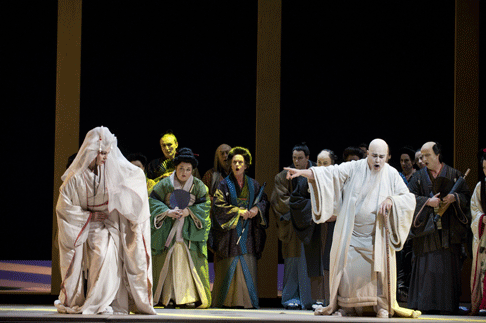 Kristīne Opolais as Cio-Cio-San and Jeremy White as Bonze
Kristīne Opolais as Cio-Cio-San and Jeremy White as Bonze
From the vigour with which Robin Leggate sang Goro, it was hard to believe that he’s retiring after the end of this production, his 909th performance at the Royal Opera House, since 1977. This Goro is directed so he moves swiftly, reflecting the character’s quick wits and cunning. Leggate sings with unflagging energy, despite having to be fleet of foot.
Similarly, Helene Schneiderman’s Suzuki was vibrant and expressive. There’s a lot more to this role than mere servant. Suzuki can be cocky, although she’s loyal. Cio Cio San isn’t completely the mistress even at home. Schneiderman intones her prayer to the gods so forcefully that when she sings with Butterfly, you pick up on the undercurrent of tension that exists even in their relationship. Suzuki’s gods will win; Cio Cio San hasn’t a chance.
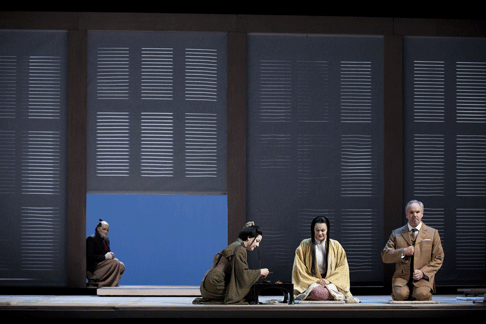 Robin Leggate as Goro, Helene Schneiderman as Suzuki, Kristīne Opolais as Cio-Cio-San and Anthony Michaels-Moore as Sharpless
Robin Leggate as Goro, Helene Schneiderman as Suzuki, Kristīne Opolais as Cio-Cio-San and Anthony Michaels-Moore as Sharpless
Buddhists don’t normally curse people, and in Japan, Buddhism co-exists with Shinto quite happily. Buddhists have a lot in common with Christians too. This Bonze is a figment of Puccini’s imagination, created to inject extreme panic, for he smashes forever Cio Cio San’s links with her past. Perhaps that’s why in this production, he appears all-white, like an apparition of a ghost from a Japanese horror story, not as a living monk. Jeremy White’s Bonze bursts onto the scene, screaming violently, striking terror. Great theatre, as Puccini must have intended.
Zhengzhong Zhou sings Prince Yamadori and Daniel Grice sings the Imperial Commissioner. Both impressed, proving how the Jette Parker Young Artists Programme nurtures singers in good directions. Yamadori is an interesting role which could be developed more than it usually is. Why would a prince marry a second-hand geisha, especially one who’s been cursed for consorting with foreigners? He rides a carriage up the steep hill, whereas everyone else in this opera walks. Why would a man of that status humiliate himself by divesting all his other wives? Zhou sings the part with tenderness, creating a sincere Yamadori who is emotionally honest and vulnerable though he has all the trappings of power. Pinkerton in reverse?
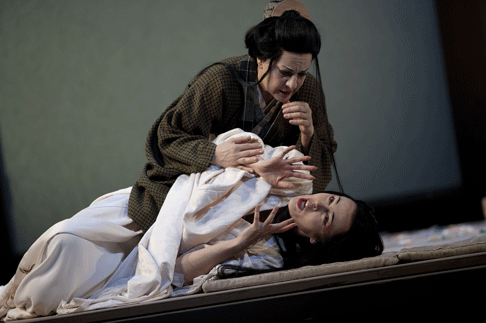 (Front to Back) Kristīne Opolais as Cio-Cio-San and Helene Schneiderman as Suzuki
(Front to Back) Kristīne Opolais as Cio-Cio-San and Helene Schneiderman as Suzuki
Andris Nelson conducted. He’s currently Music Director at the City of Birmingham Symphony Orchestra (Simon Rattle’s former post), but conducts a lot of opera, including engagements in Bayreuth, New York, Berlin and Vienna.
For more information, please see the Royal Opera House website.
Anne Ozorio